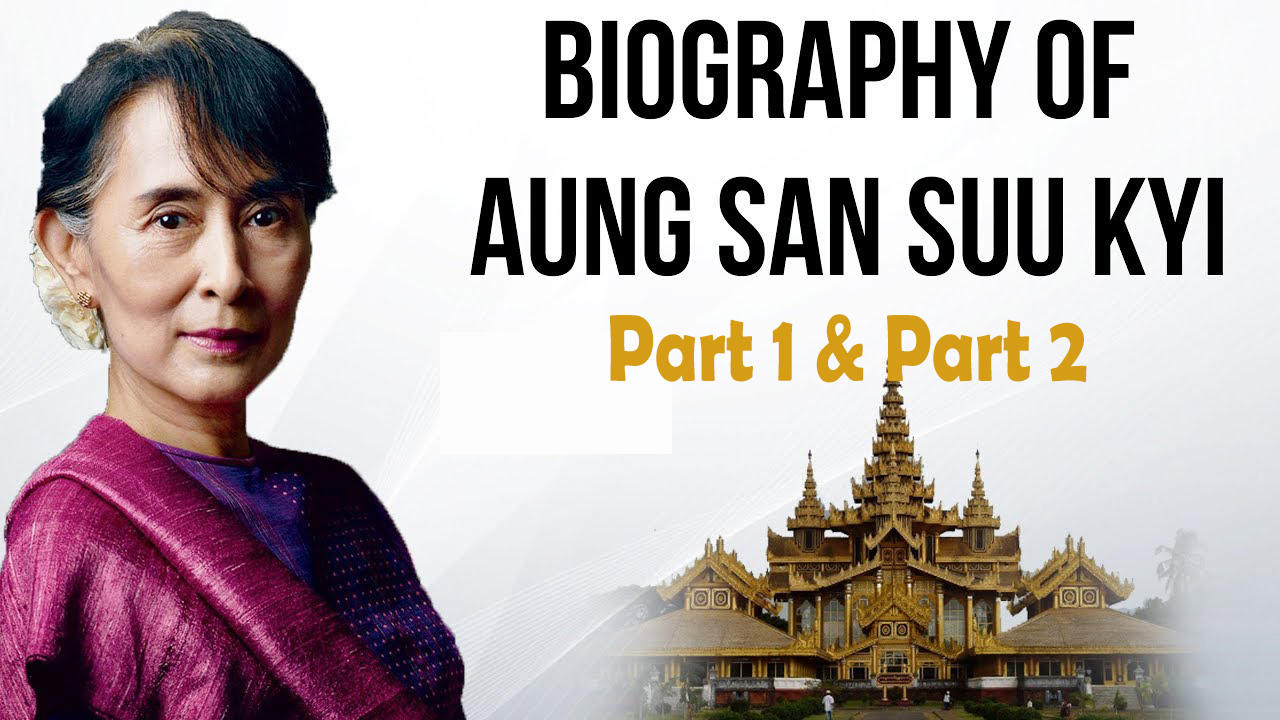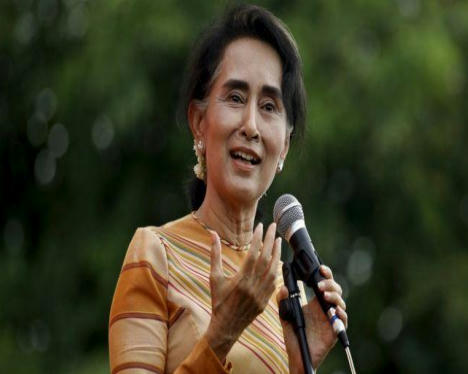Table of Contents
AUNG SAN SUU KYI
PART 1
EARLY LIFE
- Aung San Suu Kyi was born on 19 June 1945 in Rangoon (now Yangon), British Burma. Her father, Aung San, founded the modern Burmese army and negotiated Burma’s independence from the British Empire in 1947.
- He was assassinated by his rivals in the same year. She grew up with her mother, Khin Kyi, and two brothers in Rangoon. She was educated in Methodist English High School.
- Suu Kyi’s mother, Khin Kyi, gained prominence as a political figure in the newly formed Burmese government. She was appointed Burmese ambassador to India and Nepal in 1960, and Aung San Suu Kyi followed her there.
EDUCATION
-
- She studied in the Convent of Jesus and Mary School in New Delhi, and graduated from Lady Shri Ram College, a constituent college of the University of Delhi in New Delhi, with a degree in politics in 1964.
- Suu Kyi continued her education at St Hugh’s College, Oxford, obtaining a B.A. degree in Philosophy, Politics and Economics in 1967,graduating with a third and M.A. degree in politics in 1968. After graduating, she lived in New York City.
- She worked at the United Nations for three years, She was elected as an Honorary Fellow of St Hugh’s in 1990.For two years, she was a Fellow at the Indian Institute of Advanced Studies (IIAS) in Shimla, India. She also worked for the government of the Union of Burma.
POLITICAL CAREER
- In 1988, Aung San Suu Kyi returned to Burma, at first to tend for her ailing mother but later to lead the pro-democracy movement.
- In 1962, dictator U Ne Win staged a successful coup d’detat in Burma, which spurred intermittent protests over his policies during the subsequent decades. By 1988, he had resigned his post of party chairman, essentially leaving the country in the hands of a military junta.
- Mass demonstrations for democracy followed that event on 8 August 1988 (8–8–88, a day seen as auspicious), which were violently suppressed in what came to be known as the 8888 Uprising.
JUNTA
- On 26 August 1988, she addressed half a million people at a mass rally in front of the Shwedagon Pagoda in the capital, calling for a democratic government.However, in September, a new military junta took power.
- From 1988 to 1997, the SPDC was known as State Law and Order Restoration Council (SLORC), which had replaced the role of Burma Socialist Programme Party (BSPP).
- Although the regime retreated from the totalitarian Burmese Way to Socialism of BSPP when it took power in 1988, the regime was widely accused of human rights abuses.
- It rejected the 1990 election results and kept Aung San Suu Kyi under house arrest until her release on 13 November 2010.
HOUSE ARREST
- Influenced by both Mahatma Gandhi’s philosophy of nonviolence and more specifically by Buddhist concepts, Aung San Suu Kyi entered politics to work for democratization, helped found the National League for Democracy on 27 September 1988, but was put under house arrest on 20 July 1989.
- Offered freedom if she left the country, she refused. During her time under house arrest, Aung San Suu Kyi devoted herself to Buddhist meditation practices and to studying Buddhist thought.
HOUSE ARREST
- Suu Kyi was released from house arrest in July 1995, and the next year she attended the NLD party congress, under the continual harassment of the military.
- Three years later, she founded a representative committee and declared it the country’s legitimate ruling body. In response, the junta in September 2000 once again placed her under house arrest. She was released in May 2002.
- In 2003, the NLD clashed in the streets with pro-government demonstrators, and Suu Kyi was yet again arrested and placed under house confinement. Her sentence was then renewed every year, prompting the international community to call for her release.
ELECTIONS
- In 1990, the military junta called a general election, in which the National League for Democracy (NLD) received 59% of the votes, guaranteeing NLD 80% of the parliament seats.
- Instead, the results were nullified and the military refused to hand over power, resulting in an international outcry.
- Aung San Suu Kyi was placed under house arrest at her home on University Avenue in Rangoon, during which time she was awarded the Sakharov Prize for Freedom of Thought in 1990, and the Nobel Peace Prize(1991) the year after.
- Her sons Alexander and Kim accepted the Nobel Peace Prize on her behalf. Aung San Suu Kyi used the Nobel Peace Prize’s 1.3 million USD prize money to establish a health and education trust for the Burmese people..
LONG STRUGGLE
- Aung San Suu Kyi was placed under house arrest for a total of 15 years over a 21-year period,during which time she was prevented from meeting her party supporters and international visitors.
- Although under house arrest, Aung San Suu Kyi was granted permission to leave Burma under the condition that she never return, which she refused.
- The media were also prevented from visiting Aung San Suu Kyi, On several occasions during her house arrest, she had periods of poor health and as a result was hospitalized.
- On 12 November 2010, days after the junta-backed Union Solidarity and Development Party (USDP) won elections conducted after a gap of 20 years, the junta finally agreed to sign orders allowing Suu Kyi’s release, and Suu Kyi’s house arrest term came to an end on 13 November 2010.
AUNG SAN SUU KYI
PART 2
RELEASE
- In May 2009, just before she was set to be released from house arrest, Suu Kyi was arrested once more, this time charged with an actual crime—allowing an intruder to spend two nights at her home, a violation of her terms of house arrest.
- The intruder, an American named John Yettaw, had swum to her house after allegedly having a vision of an attempt on her life. He was also subsequently imprisoned, returning to the United States in August 2009.
- The United Nations declared that Suu Kyi’s detention was illegal under Myanmar law. In August, however, Suu Kyi went to trial and was convicted and sentenced to three years in prison. The sentence was reduced to 18 months, and she was allowed to serve it as a continuation of her house arrest.
RELEASE
- Aung San Suu Kyi has received vocal support from Western nations in Europe,Australia and North and South America, as well as India, Israel,Japan the Philippines and South Korea.
- In December 2008, the United Nations General Assembly passed a resolution condemning the human rights situation in Burma and calling for Aung San Suu Kyi’s release—80 countries voting for the resolution.
- On the evening of 13 November 2010, Aung San Suu Kyi was released from house arrest.This was the date her detention had been set to expire according to a court ruling in August 2009.
- She appeared in front of a crowd of her supporters, who rushed to her house in Rangoon when nearby barricades were removed by the security forces.
ELECTIONS
- Aung San Suu Kyi had been detained for 15 of the past 21 years.In November 2011, following a meeting of its leaders, the NLD announced its intention to re-register as a political party.
- In November 2011, the NLD announced that it would re-register as a political party, and in January 2012, Suu Kyi formally registered to run for a seat in parliament.
- On April 1, 2012, following a grueling and exhausting campaign, the NLD announced that Suu Kyi had won her election and on May 2, 2012, Suu Kyi took office.
ELECTIONS
- On 16 June 2012, Aung San Suu Kyi was finally able to deliver her Nobel acceptance speech (Nobel lecture) at Oslo’s City Hall, two decades after being awarded the peace prize.
- The current Constitution, which came into effect in 2008, bars her from the presidency because she is the widow and mother of foreigners – provisions that appeared to be written specifically to prevent her from being eligible.
- The country again held parliamentary elections on November 8, 2015, in what was viewed as the most open voting process in decades. .
ELECTIONS
- Less than a week later, on November 13 2015, the NLD was officially able to declare a landslide victory, having won 378 seats in a 664-seat parliament.
- Under the 2008 constitution, the NLD needed to win at least a two-thirds majority in both houses to ensure that its candidate would become president.
- Before the elections, Aung San Suu Kyi announced that even though she is constitutionally barred from the presidency, she would hold the real power in any NLD-led government.
- On 30 March 2016 she became Minister for the President’s Office, for Foreign Affairs, for Education and for Electric Power and Energy in President Htin Kyaw’s government.
ROHINGYA CRISIS AND CRITICISM
- Her tenure as State Counsellor of Myanmar has drawn international criticism for her failure to address her country’s economic and ethnic problems, particularly the plight of the Rohingya.
- International community began looking into a series of escalating attacks on the Rohingya Muslims of Myanmar’s coastal state of Rakhine.
- In October 2016, soldiers and civilian mobs banded together to terrorize and destroy Rohingya villages. A larger wave of violence erupted in August 2017, resulting in more than 600,000 Rohingya refugees fleeing across the border to Bangladesh.
- Previously known for her courage in the face of military abuses, Suu Kyi now drew criticism for seemingly turning a blind eye to these atrocities.
ROHINGYA CRISIS AND CRITICISM
- In 2017, critics have called for Aung San Suu Kyi’s Nobel prize to be revoked, citing her silence over the persecution of Rohingya people in Myanmar.
- In 2016, Aung San Suu Kyi was accused of failing to protect Myanmar’s Rohingya Muslims during the 2016–17 persecution. Despite continued persecution of the Rohingya well into 2017, Aung San Suu Kyi was “not even admitting, let alone trying to stop, the army’s well-documented campaign of rape, murder and destruction against Rohingya villages”.
- In early October 2018, both the Canadian Senate and its House of Commons voted unanimously to strip Aung San Suu Kyi of her honourary citizenship. This decision was caused by the Government of Canada’s determination that the treatment of the Rohingya by Myanmar’s government amounts to Genocide.


























 WhatsApp
WhatsApp